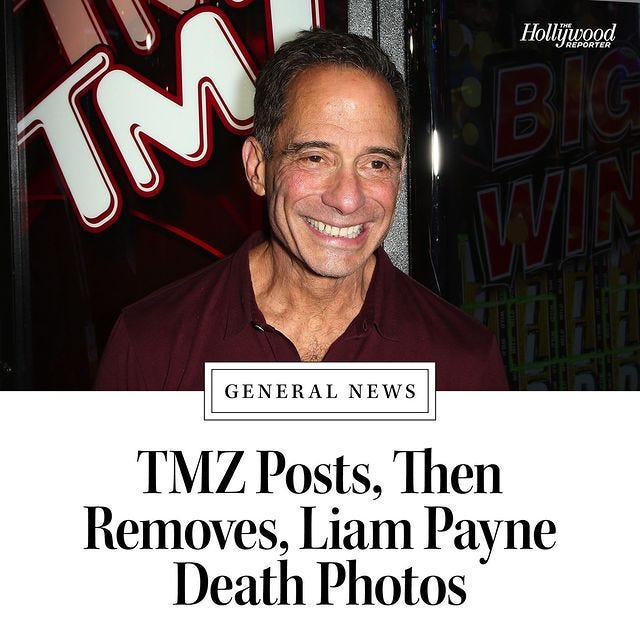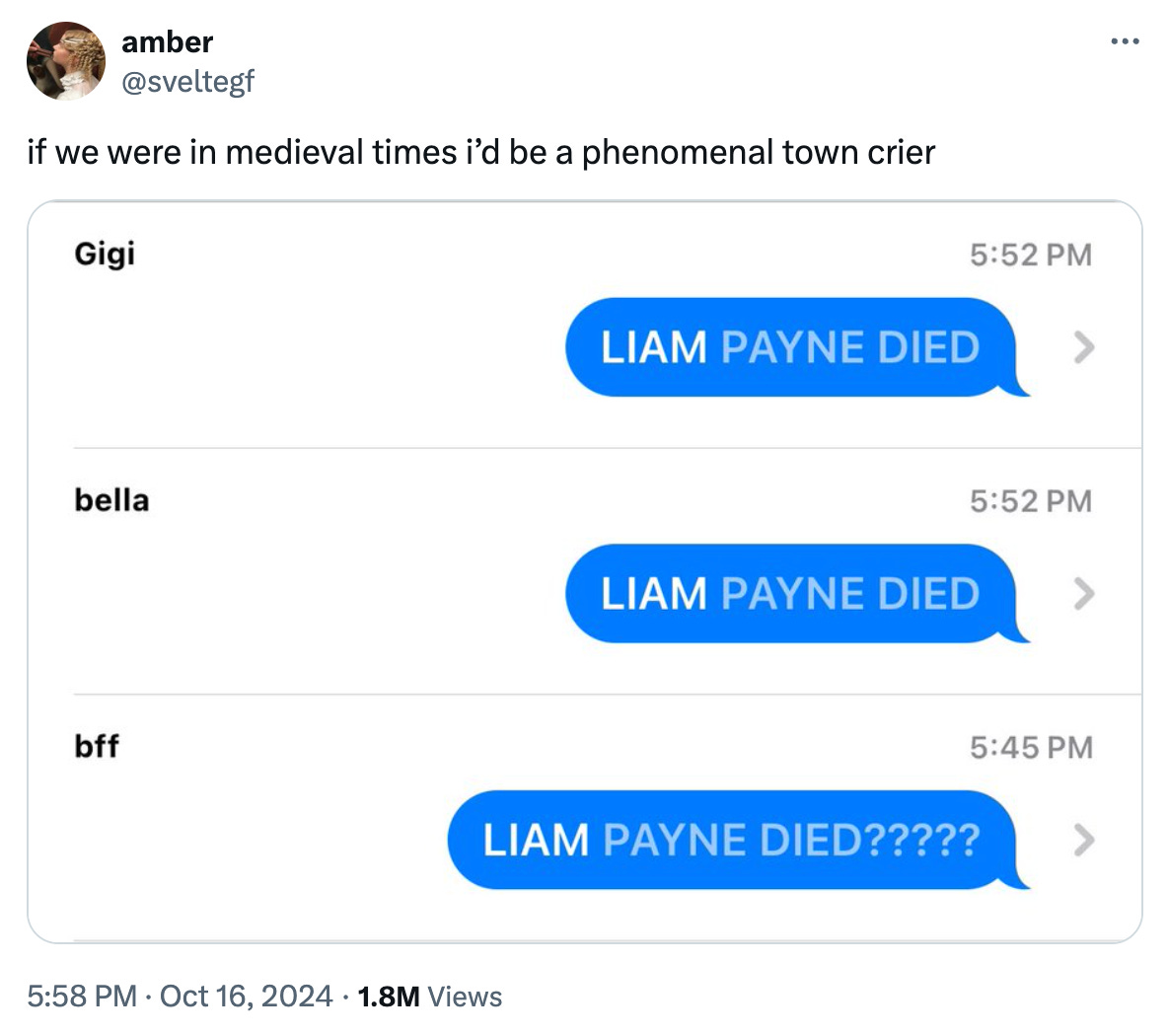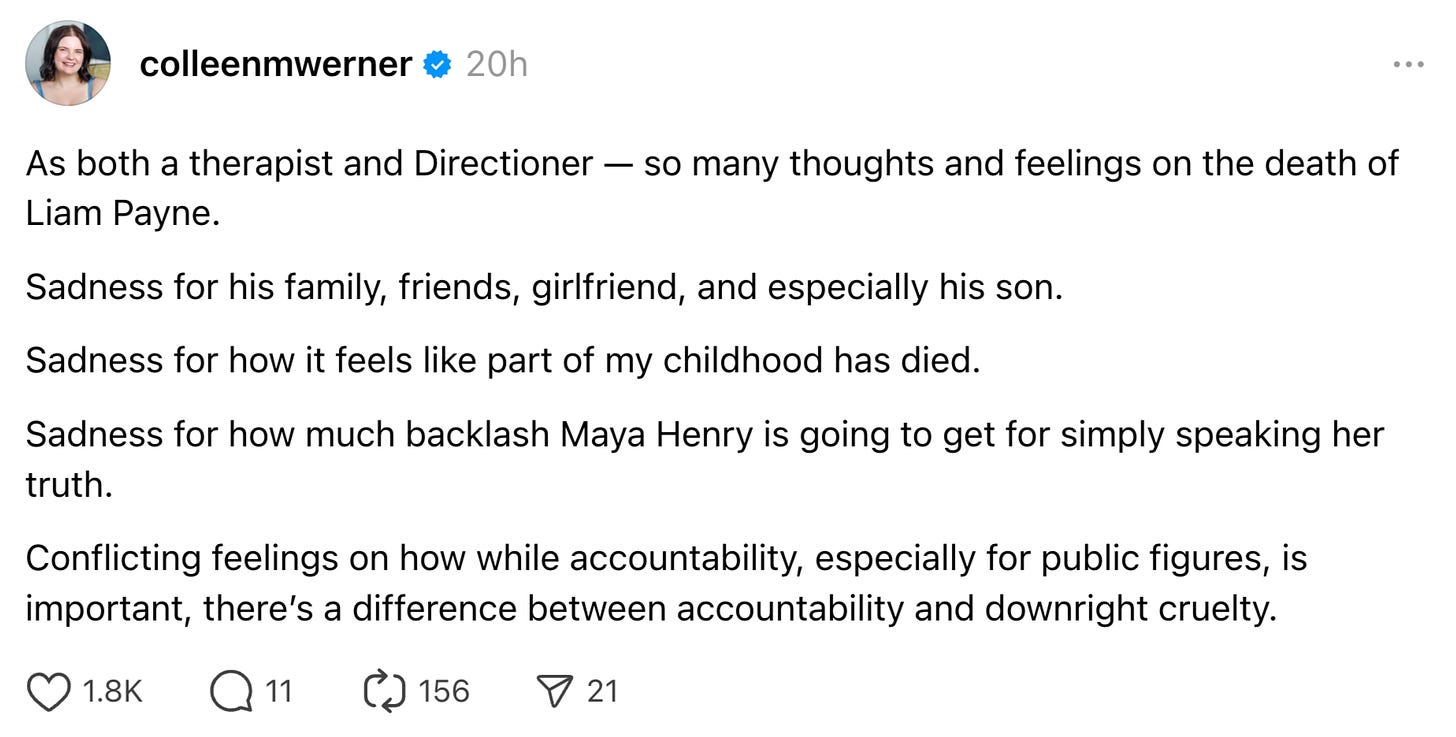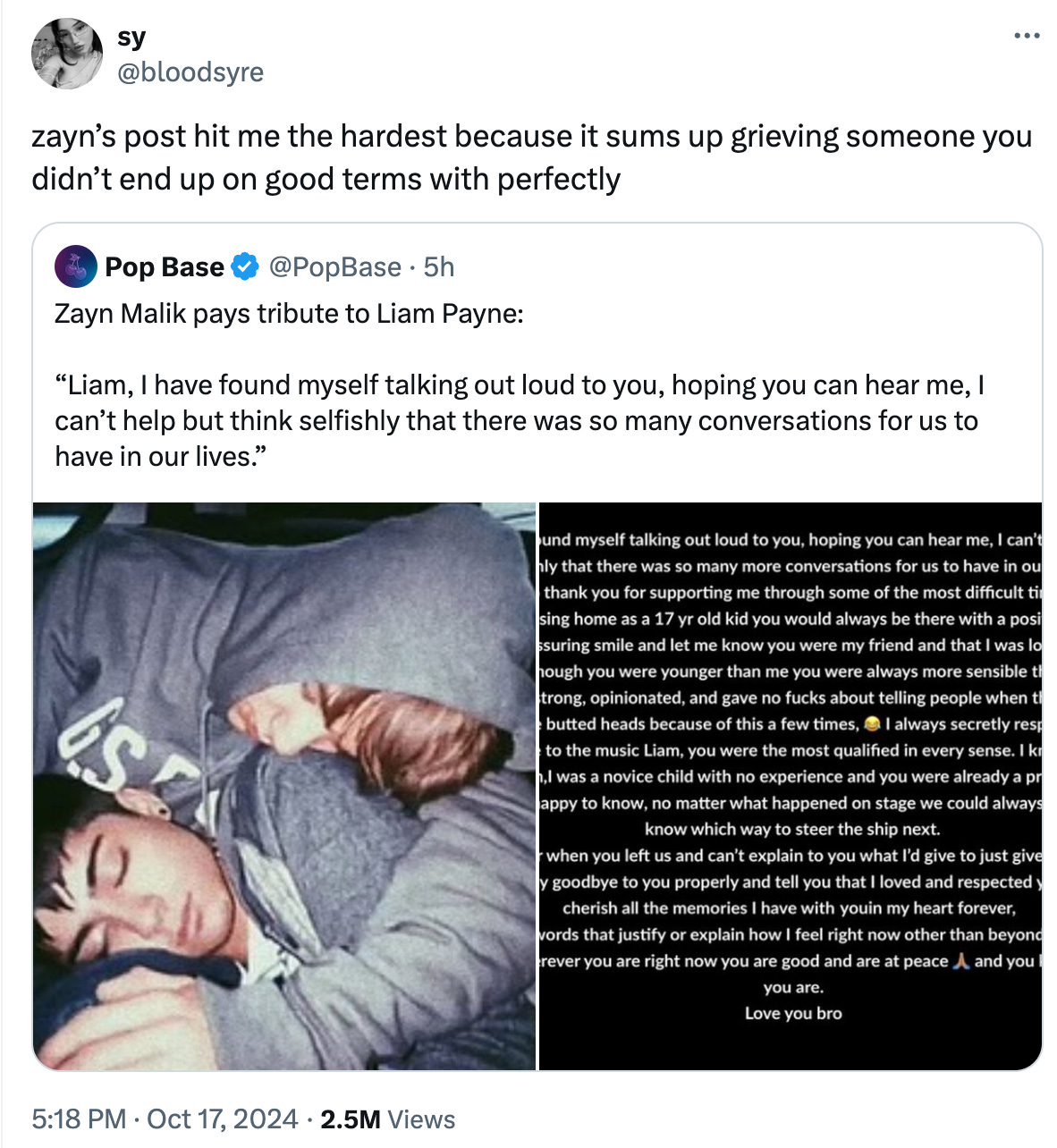Parasocial grief and dealing with a celebrity's death online
Social media in the wake of Liam Payne's passing
Welcome to Gen Z Translator, where I break down trending topics on Fridays. If you’re new, you can subscribe here and follow me on Threads or X. Views are my own.
This is not the newsletter I expected to be writing this week (in fact, I said last week I probably wouldn’t write one at all) but Liam Payne’s death has sent shockwaves across the internet. It reminded me that how we handle death online has been bothering me for awhile.
According to *The Associated Press, “Former One Direction singer Liam Payne, 31, whose chart-topping British boy band generated a global following of swooning fans, was found dead Wednesday after falling from a hotel balcony in Buenos Aires, local officials said.”
Conspiracies are spreading. People are rationalizing the event. Supposed photos from his hotel room are making their way around the internet, as well as 911 calls and voicemails. TMZ published photos of Liam’s body before removing the post, according to The Hollywood Reporter.
And of course, there are the memes. There are always the memes.
I noticed this kind of treatment particularly around the death of Prince Philip and Queen Elizabeth II. “Prince Philip, as well as many of the Royals, could certainly be described as a divisive figure, so it should have been expected that an endless memes would quickly make the rounds mocking his passing,” Peter Suciu wrote for Forbes in August of 2021.
I don’t know if this is controversial to say, but I don’t agree with memeing on someone who has died. (This is coming from a person who has a meme section in her newsletter). I wonder if people would behave the same way they do on social media as they would attending a funeral, faced with a casket and an obituary.
I also think about if it were me. I wouldn’t want the news of my death to immediately bring ridicule. I wouldn’t want my legacy to be getting made fun of online.
I would hope my memory would be respected.
Jimmy Carter, who turned 100 years old, is seeing similar jokes online to Prince Philip, and he hasn’t died yet. Part of this is the public decrying the publicity of his current condition. “Why his family brought him out like this is beyond me. Shameful really. For a political photo op,” X user @jaysonica posted in response to photos of the former president. But others simply aim to poke fun at him.
The duality of someone’s life upon their death seems to be the hardest concept for the internet to grasp.
“If you’re not in the fandom you might not be aware of Liam’s history of addiction and mental health struggles, that his ex has been very outspoken recently about their toxic relationship and his problematic behaviour. You might not have seen the escalation of negative posts and comments about Liam on social media alongside that,” Threads user @juliekroberts said. “It’s important to believe and support victims, but this was trial by social media and devolved into straight up trolling.”
Multiple X users reiterated this point from @giftedswifted: “People aren’t mourning who Liam Payne became- they’re mourning the boy who was part of their youth, the music that defined a generation, and the memories tied to someone who once meant everything to so many (and that doesn’t take away that he was horrible in the end)”
“I didn’t know Liam. He may well have been a bad guy and a bigger monster behind closed doors than we thought. Or maybe he was a troubled individual whose toxic relationships and very human flaws were amplified by the intense public scrutiny that comes with fame who didn’t have the support he needed at a critical moment to keep him safe,” Threads user @juliekroberts continued. “At best, this recent escalation was going to end with Liam in rehab. Instead it reached the most definitive possible conclusion even sooner than anticipated.”
Some posts in the wake of a celebrity’s death are genuine. Then there are the posts that toe the line between informational and inflammatory. The wonder of the internet is that anyone can post anything – unless it goes against community guidelines.
I can’t speak for others, but I won’t circulate memes making fun of someone’s death. I will cite my sources, but I won’t repost or spotlight crass takes in my content. You don’t have to like everyone, but I do believe everyone is deserving of basic human respect.
Then, there is the parasocial aspect to this equation. I’ve described the term as a “one-sided relationship where one party feels like they deeply know the other, going so far as to consider themselves friends when they’re not.” This phenomenon is often strengthened by social media giving us a deeper window into a celebrity’s life. For example, fans took to Liam Payne’s Snapchat to see if it could give insight into his final hours.
How do you deal with grieving someone you’ve never met? Someone whose awareness of you is little to none? According to a Psychology Today article from 2021, “Research shows that both anticipated and actual loss of a parasocial relationship is related to the intensity of the existing parasocial relationship, in addition to relational vulnerabilities such as attachment anxiety or loneliness.”
“In the age of social media, we are also witness to the grief of other media figures to whom we may feel parasocially attached. This may increase the intensity of our own reaction as we read or hear poignant and personal tributes acknowledging the loss of colleagues and friends.” –Dara Greenwood Ph.D., “Parasocial Losses: Why It Hurts When a Celebrity Dies”
One Direction had a huge fanbase. *AP called them “the internet’s first boy band.” They defined many people’s childhoods – fans grew up with the British boy band and learned how to express their admiration for the singers online. Tumblr, fanfiction, grainy Instagram edits, you name it. 1D was a cultural moment.
“I feel like I’ve lost someone I knew - parasocial relationships will do that to you. Just because you never spoke to them doesn’t mean they didn’t in some way speak to you - a loss is a loss, and no one can tell you differently,” @shityoushouldcareabout wrote.
“It’s exactly as confusing and confronting and devastating as I thought it would be, and while I understand that it’s the price we pay for loving (and dare I say obsessing over) someone or something so hard, it doesn’t make it any easier.”
Grief is real in any form. But our online reaction to a celebrity’s death does raise an interesting question about how far we’re willing to take the conversation in an age of unbridled internet access. Is there an appropriate way to to respect someone’s memory online while still seeking out the truth?
No matter my personal opinion about a public figure who has died, I hope they will be able to rest in peace.
*Transparency clause: I work on contract for The Associated Press
Read my last story: Pop Crave and Poo Crave









